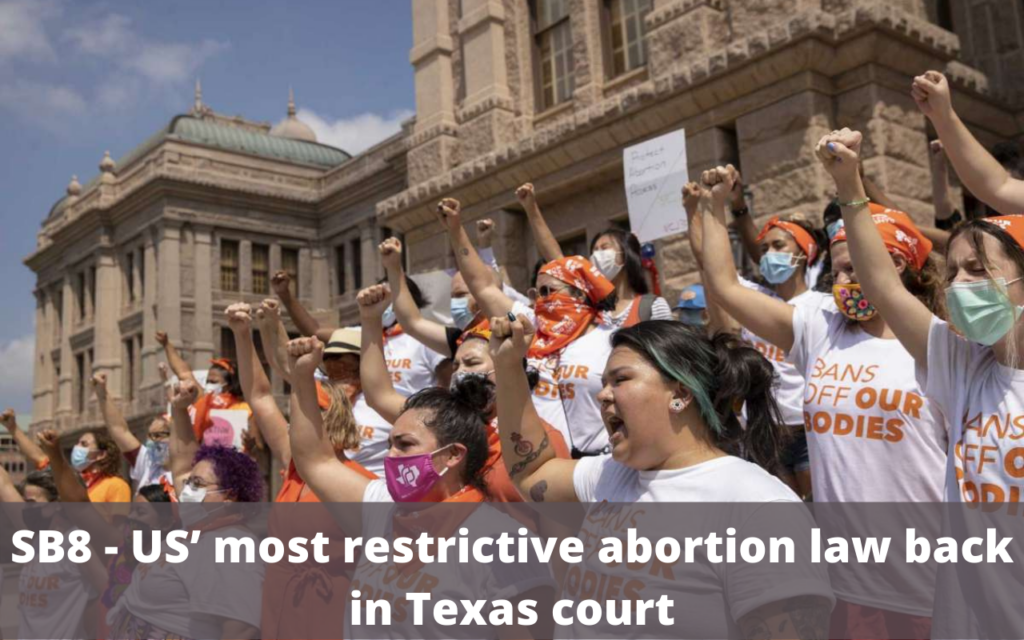On Friday a federal judge will examine if Texas can leave in place the country’s most restrictive abortion law which has banned most abortions since September and caused women to run beyond the borders of the nation’s second-largest state just to get care.
Senate Bill 8 is Texas’s abortion law which will get its first legal blow from the lawsuit filed by the Biden administration. So far, SB8 has endured early challenges including U.S. Supreme Court’s permission for it to remain in force.
On Thursday, a Texas abortion provider, Dr. Ghazaleh Moayedi, told the U.S. House Oversight and Reform Committee during a earing over abortion access, “abortion care has almost completely stopped in our state.”
SB8 prohibits abortions in Texas after the early detection of a fetal heartbeat, typically around six weeks, which usually happens before some women learn about their pregnancy. According to abortion providers in Texas, in the short period when the law was implemented in Sept 1, the reality has become “exactly what we feared”, adding that abortion clinic are now in danger of closing and neighboring states are now trying hard to keep up with the sudden increase in the number of patients driving all the way from Texas. Some women say they are left with no choice but to continue their pregnancies to term.
On Friday, US District Judge Robert Pitman of Austin will hear arguments on possibly stopping the Texas law temporarily as this has become the nation’s biggest threat to the constitutional right to an abortion in the last fifty years.
Quick action from the court has been pushed by the Justice Department but Pitman’s decision is still unknown.
It is also uncertain how fast the abortion clinics in Texas can move to continue normal operations if the law is temporarily halted. Texas officials is expected to ask for a quick reversal from the 5th U.S. Circuit Court of Appeals, which previously allowed the restrictions to take effect.
Texas’ SB8 is just one that is building up the biggest trial against abortion rights in the US for decades.
The U.S. Supreme Court begins a new term Monday. And in December the arguments in Mississippi’s bid to have the landmark Roe v. Wade decision assuring a woman’s right to an abortion overturned will be included.
Last month, the court did not rule on the constitutionality of Texas’ SB8 in permitting it to stay in place. However, the 5-4 vote has given the abortion providers as an unpromising sign about where the court, majority of which are conservative with the three appointees of former President Donald Trump, might be heading on abortion.
In the South, other states have passed the same laws that prohibit abortion during early pregnancy but were blocked by the judges. However, a wrinkle to Texas’ version has circumvented courts, that is, the private citizens and not prosecutors will be the enforcement.
Under SB8, anyone can file a lawsuit to both abortion providers and persons suspected of helping a women in getting the abortion after a fetal heartbeat is detected. An entitlement of at least $10,000 in damages can be awarded to the person bringing the lawsuit if they prevail. Most of the critics say this can be a bounty.
This week, the Texas Attorney General’s Office argued in court filings that even with a temporary halt of the law, abortion providers could still be in danger of litigation against violations that may happen in the time between a permanent ruling.
“The federal government’s complaint is that the Heartbeat Act is difficult to effectively enjoin,” the state wrote in objection to the lawsuit by the Biden administration. “But there is no requirement that a state write its laws to make them easily enjoined.”
Read More- New details About Brian Laundrie’s Demeanor Days After His Fiance’s Disappearance Surface
At least one Texas abortion provider has admitted to violating the law and been sued — but not by abortion opponents. According to former attorneys in Illinois and Arkansas they instead filed a case against a San Antonio doctor in hopes of getting a judge who would invalidate the law.
Read More- In The United States, Unemployment Claims Increased For The Third Consecutive Week

